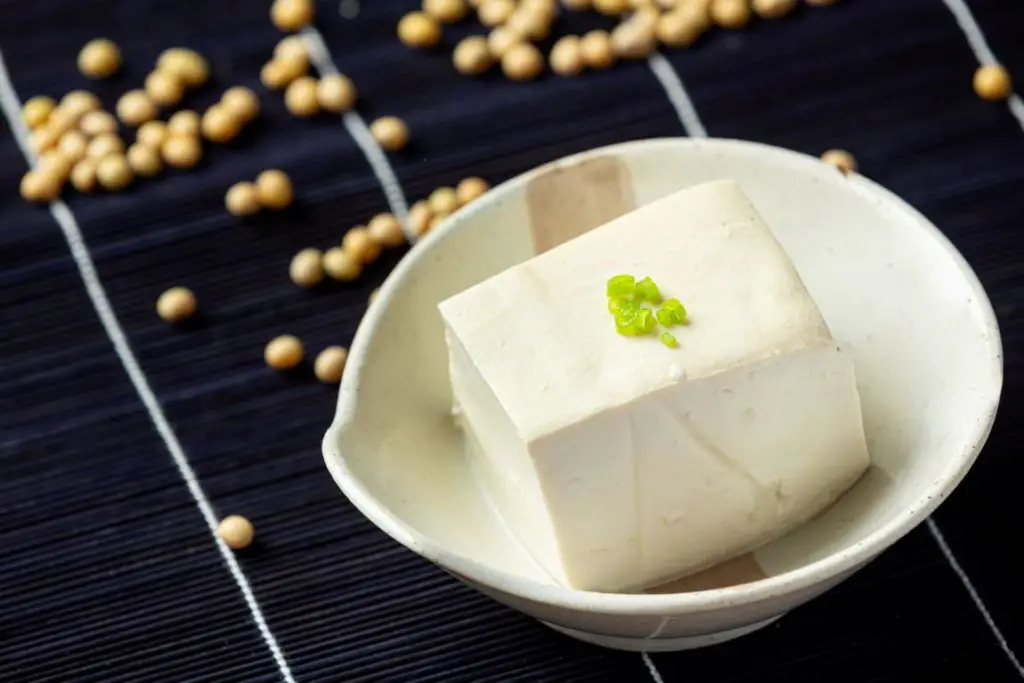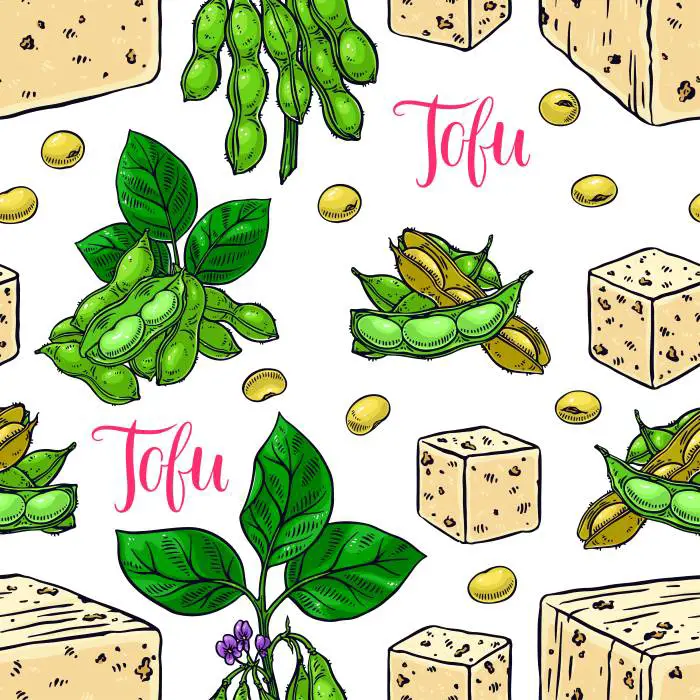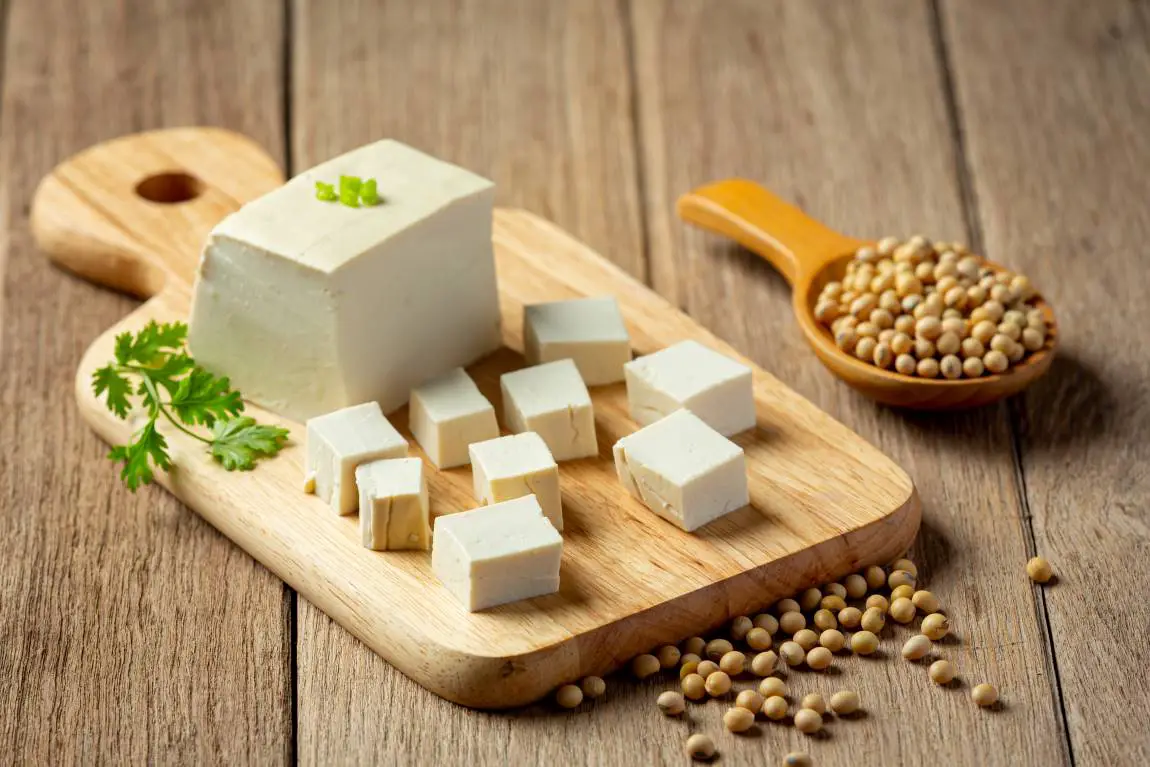Is tofu high in histamine? It’s a question you must always ask if you have histamine intolerance. Let’s take a closer look at what tofu is, whether it contains significant histamine, and a closer look at whether it’s a healthy food.
Tofu is a soy product with a subtle flavor that takes on the flavor of the sauce you put on it. Manufacturers make tofu by curdling fresh soymilk, pressing the curds into blocks. (1) Tofu is popular as a source of protein for vegetarian and vegan diets.
Tofu comes in different textures: silken, soft, firm, and extra-firm. People often add soft and silken tofu to smoothies and desserts while extra-firm tofu is popular as a meat substitute. For example, you can marinate or grill tofu to give it a meat-like texture.
Tofu is high in protein, containing all the essential amino acids your body needs but can’t make. It’s also low in calories and fat and contains a variety of B-vitamins and minerals, including iron, magnesium, phosphorus, copper, selenium, and calcium. (2) So, it’s a nutritious source of protein and other nutrients.
Why You Should Be Concerned about Histamine in Food
Histamine, a naturally occurring chemical in our body, has widespread roles, from regulating stomach acid production to aiding in immune responses. But if you have histamine intolerance you don’t break histamine down as quickly and it stays in your body longer.
Your body uses an enzyme called diamine oxidase, or DAO, to break down histamine. If you don’t have enough of this essential enzyme, the histamine you consume through diet can build up and trigger histamine intolerance symptoms and the familiar symptoms of histamine intolerance.
Some people form less diamine oxidase than others and genetics may explain these differences. If you have low diamine oxidase, eating histamine-rich foods of any type can overwhelm your body’s ability to eliminate it.
Excessive histamine can trigger various effects, including itching, flushing, headaches, nasal congestion, hives, and digestive disturbances. For individuals with histamine intolerance, even normal histamine levels can lead to unpleasant symptoms.
The reason you should follow a low-histamine diet with histamine intolerance is to reduce the amount of dietary histamine you consume. When you get too much, it can trigger symptoms.
Histamines in Tofu: Is Tofu High in Histamine?
Tofu is a type of unfermented soy product, but there are also fermented types of soy foods. Two examples are miso and tempeh. Fermented forms of soy are nutrient rich and contain probiotic bacteria.
For people without histamine issues, probiotics from food sources are beneficial – they help support a healthy gut microbiome. Yet the same gut-friendly bacteria produce histamine and can overwhelm your body’s ability to eliminate it.
Fermented foods are off limits if you have histamine intolerance. The bacteria that ferment these foods can also be histamine producers and overwhelm your body’s ability to break it down.
Avoid Fermented Forms of Soy – but What about Tofu?
Since tofu isn’t fermented, it’s less problematic from a histamine standpoint than fermented forms of tofu like tempeh and miso. Histamine is one type of biogenic amine. Other biogenic amines include tyramine, cadaverine, tryptamine, putrescine, spermidine, spermine, among others. (4)
Some biogenic amines, like putrescine and cadaverine, only cause intolerance issues if you consume them in large amounts. In contrast, histamine and tyramine are more problematic, even in smaller doses. The problem is cadaverine and putrescine can potentiate the effects of histamine and tyramine if you consume them together. (10)
Now you see why all biogenic amines can be a problem. Even ones that don’t cause problems in low amounts can enhance the effects of histamine and worsen histamine sensitivity symptoms. If you have histamine intolerance, you’ll want to avoid foods that are high in other biogenic amines as well.

What a Study Showed about Tofu and Biogenic Amines
A study published in International Food Research Journal (3) looked at the biogenic amine content of a variety of tofu samples. The study found that although tested tofu samples contain varying quantities of biogenic amines, the levels were low in most samples. The most common were putrescine and tryptamine.
But on a precautionary note, 14.3% of the tofu samples they tested had greater than 100 milligrams per kilogram of biogenic amines. (4) That’s an amount that could pose problems if you have histamine intolerance.
Based on this study, some tofu you buy in packages at the grocery store may be low enough in biogenic amines that they pose little or no problem if you have histamine intolerance. But that’s not universally the case.
Depending on how manufacturers process tofu, it can contain biogenic amines, including histamine. That’s why you should introduce tofu slowly into your diet and see how you respond.
Discover more about the histamines in meat.
The Histamine Content of Tofu Depends on Its Processing
Unfortunately, there’s no way to look at a tofu package and determine whether it’s low in histamine and other biogenic amines or not. It depends on how it’s manufactured and processed. It’s unfortunate that vegans and vegetarians with histamine intolerance can’t buy tofu low in histamine and other biogenic amines.
That’s why it’s best to avoid tofu and other forms of soy unless you know it was manufactured in a way that makes it low in histamine and biogenic amines. As far as I know, there’s no way to get that assurance when you buy tofu.
Beyond Histamine Intolerance, the Anti-Nutrient Effects of Tofu
Tofu is a controversial food. Although nutritious, it contains anti-nutrients, including phytates and trypsin inhibitors. (11) Phytates are antioxidant compounds in various plant-based foods. Although the antioxidant benefits are appealing, phytates also reduce how much iron, zinc, and calcium your body absorbs from foods.
Trypsin is an enzyme that breaks down proteins. The concern is that consuming trypsin inhibitors, you block this enzyme and don’t digest proteins in your diet as well. However, this is unlikely to be a concern unless you consume large quantities of tofu or eat a mineral-deficient diet.
On a more positive note, a study found that consuming soy foods reducing levels of circulating inflammatory markers in the bloodstream in Chinese women. (6) Tofu is a popular food in Asian countries.

Tofu Also Contains Isoflavones
Another component of tofu that has raised controversy is isoflavones, phytoestrogens, a type of plant-based estrogen. They are not the same thing as human estrogen, but they can have similar effects in the body. (7)
Other foods that contain smaller quantities of isoflavones include legumes, vegetables, fruits and herbs including chickpeas, alfalfa, fava beans, lentils, clover, dandelion greens
Isoflavones bind to the same receptors that estrogen does but has weaker activity. Some studies suggest that isoflavones in foods like soy may lower the risk of breast cancer by blocking the effects of stronger estrogens on breast tissue. But some experts believe the isoflavones may not be beneficial and could be harmful depending on how much you consume and at what age and stage of life.
On the plus side, a study published in the journal Circulation that involved 200,000 people found that eating at least one serving of tofu per week was associated with am 18% lower risk of heart disease relative to those who ate little or no tofu. It’s an area that needs more research.
Can You Eat Tofu on a Low-Histamine Diet?
Is tofu high in histamine? Tofu is a nutritious food but one that, depending on how its processed, may contain biogenic amines, including histamine. Although histamine isn’t the most common biogenic amine in tofu, all biogenic amines can cause problems in high enough amounts and when you consume multiple biogenic amines.
If you have histamine intolerance, tofu is a food you should approach with caution or avoid entirely. It’s even more important to stay away from fermented soy foods like miso and tempeh. As always, keep a food diary, so you’ll know how you respond to foods.
References:
- “How Tofu Is Processed – IFT.org.” 01 Feb. 2016, https://www.ift.org/news-and-publications/food-technology-magazine/issues/2016/february/columns/processing-how-tofu-is-processed
- “Tofu, firm, prepared with calcium … – SELF Nutrition Data.” https://nutritiondata.self.com/facts/legumes-and-legume-products/4393/2.
- International Food Research Journal 26(3): 999-1009 (June 2019)
- “Biogenic Amine – an overview | ScienceDirect Topics.” https://www.sciencedirect.com/topics/chemistry/biogenic-amine.
- Guan, R. F., Liu, Z. F., Zhang, J. J., Wei, Y. X., Wahab, S., Liu, D. H. and Ye, X. Q. 2013. Investigation of biogenic amines in sufu (furu). A Chinese traditional fermented soybean food product. Food Control 31(2):345-352.
- Wu SH, Shu XO, Chow WH, Xiang YB, Zhang X, Li HL, Cai Q, Ji BT, Cai H, Rothman N, Gao YT, Zheng W, Yang G. Soy food intake and circulating levels of inflammatory markers in Chinese women. J Acad Nutr Diet. 2012 Jul;112(7):996-1004, 1004.e1-4. doi: 10.1016/j.jand.2012.04.001. PMID: 22889631; PMCID: PMC3727642. https://pubmed.ncbi.nlm.nih.gov/22889631/
- Xiao CW. Health effects of soy protein and isoflavones in humans. J Nutr. 2008 Jun;138(6):1244S-9S. doi: 10.1093/jn/138.6.1244S. PMID: 18492864.
- “Soy-rich foods like tofu may help lower heart disease risk ….” 23 Mar. 2020, https://www.heart.org/en/news/2020/03/23/soy-rich-foods-like-tofu-may-help-lower-heart-disease-risk.
- Isoflavone Intake and the Risk of Coronary Heart Disease in US Men and Women Results From 3 Prospective Cohort Studies Le Ma, Gang Liu, Ming Ding, Geng Zong, Frank B. Hu, Walter C. Willett, Eric B. Rimm, JoAnn E. Manson, and Qi Sun. Originally published23 Mar 2020https://doi.org/10.1161/CIRCULATIONAHA.119.041306Circulation. 2020;141:1127–1137.
- Stratton JE, Hutkins RW, Taylor SL. Biogenic Amines in Cheese and other Fermented Foods: A Review. J Food Prot. 1991 Jun;54(6):460-470. doi: 10.4315/0362-028X-54.6.460. PMID: 31051616. https://pubmed.ncbi.nlm.nih.gov/31051616/
- Ishiguro T, Ono T, Nakasato K. The localization of phytate in tofu curd formation and effects of phytate on tofu texture. J Food Sci. 2008 Mar;73(2):C67-71. doi: 10.1111/j.1750-3841.2007.00620.x. PMID: 18298718. https://pubmed.ncbi.nlm.nih.gov/18298718/

